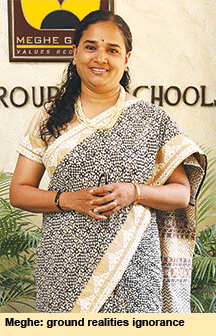 The BJP/Shiv Sena government of Maharashtra — India’s most industrial state (pop.112 million) — is under opposition fire for its suggestions made to the Delhi-based Union human resource development ministry which is putting the finishing touches to its much awaited New Education Policy (NEP). The report uploaded on the state government’s website on November 9, generated a volley of criticism and bad press forcing the education ministry to pull it off the website just days after it was posted.
The BJP/Shiv Sena government of Maharashtra — India’s most industrial state (pop.112 million) — is under opposition fire for its suggestions made to the Delhi-based Union human resource development ministry which is putting the finishing touches to its much awaited New Education Policy (NEP). The report uploaded on the state government’s website on November 9, generated a volley of criticism and bad press forcing the education ministry to pull it off the website just days after it was posted.
Under the Union HRD ministry’s consultative process begun on Republic Day (January 26), the public and state governments were invited to submit their recommendations on 14 education-related themes for inclusion in NEP 2016. The Maharashtra government’s recommendations report was a compilation of a two-day conclave held on November 5-6. In turn, the state government also asked citizens to submit their suggestions and objections by November 23.
But no sooner was the state government’s recommendations report uploaded on its website, it came under heavy fire from teachers’ groups and political representatives for its impractical content as well as its haphazard style of soliciting public opinion. Some of the heavily criticised recommendations included compulsory use of Marathi as the medium of instruction in primary education, extended school timings, one curriculum for all and introducing a year-long rigorous development programme for school principals.
“The government’s penchant for promoting regional languages over English shows just how ignorant it is of ground realities. Today English is a universal aspirational language and parents themselves prefer their children learning in English medium,” says Abha Meghe, director of the Nagpur-based Meghe Group of schools.
In addition, the state government’s 44-page recommendations report also advises “100 percent students in schools learning for eight hours a day,” on the ground that it will ensure more “effective learning”. However, it doesn’t cite any study or evidence to support this recommendation except “lots of research”. Currently, most primary-secondaries in Mumbai follow a six-seven hours day.
Private school managements are also unenamoured with the state government’s “one nation one curriculum” or common school curriculum recommendation. “Such a proposal is not advisable at all. Currently, students have the right to follow the syllabuses/curriculums prescribed by the Central Board of Secondary Education (CBSE), Council for the Indian School Certificate Examinations (CISCE), the Cambridge International Examinations (CIE) and International Baccalaureate Organisation (IBO) apart from 29 state examination boards. This is nothing but an attempt to level down the quality of education to deprive parents/students of choice, and level primary-secondary education to the lowest common denominator of a government prescribed curriculum,” says S.C. Kedia, president of the Mumbai-based Unaided Schools Forum.
The Maharashtra government’s prevarication and last-minute flurry of activity also attracted the ire of opposition politicians.
Kapil Patil, president of the Lok Bharti party, and member of the state legislative council representing the Mumbai Teachers Constituency in the upper house, describes the whole consultancy exercise a massive hoax. “The state government had already drafted the report before its claim of having conducted discussions in 25,108 villages on November 7-8. How could so many villages be covered in just two days? The BJP government at the Centre has already written out NEP 2016 following the RSS school of thought. All this talk about conducting grassroot-level consultations is nothing but a sham,” says Patil.
Meanwhile, the embarrassed Maharashtra state government whose attention seems to be focused on banning consumption of beef and enforcing its ban on dance bars (struck down by the Supreme Court as unconstitutional) is at pains to clarify that the recommendations report is a draft and the issues raised in it were a summary of public suggestions, rather than the state government’s opinion.
Dipta Joshi (Mumbai)























